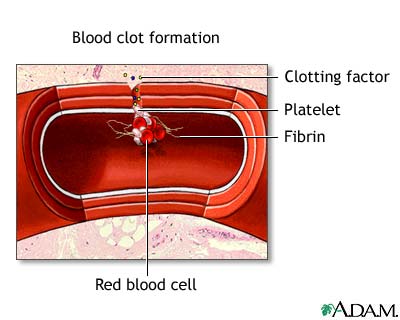Treatment
Medications such as desamino-8-arginine vasopressin (DDAVP) can be given to raise the levels of von Willebrand factor, which will reduce the tendency toward bleeding.
Some types of von Willebrand disease do not respond to DDAVP. Tests should be done to determine a patient’s specific type of von Willebrand disease before trauma or surgery occurs. A trial of DDAVP can be done before surgery to test whether von Willebrand factor levels increase.
The drug Alphanate (antihemophilic factor) is approved to decrease bleeding in patients with the disease who must have surgery or any other invasive procedure.
Blood plasma or certain factor VIII preparations may also be used to decrease bleeding.
Prognosis (Expectations)
Women who have this condition generally do NOT have excessive bleeding during childbirth.
Although this disease is passed down through families, genetic counseling is only rarely recommended for those considering pregnancy.
Complications
Bleeding (hemorrhaging) may occur after surgeries or other invasive procedures.
If you have von Willebrand disease, do not take nonsteroidal anti-inflammatory drugs (NSAIDs), such as aspirin or ibuprofen, without talking to your health care provider.
Calling Your Health Care Provider
Call your health care provider if bleeding occurs without reason.
If you have von Willebrand disease and are scheduled for surgery or are in an accident, be sure you or your family notify the health care providers about your condition.
-
Von Willebrand disease: Overview, Causes
-
Von Willebrand disease: Symptoms & Signs, Diagnosis & Tests
-
Von Willebrand disease: Treatment
Review Date : 3/21/2008
Reviewed By : Stephen Grund, M.D. Ph.D., Chief of Hematology/Oncology and Director of the George Bray Cancer Center at New Britain General Hospital, New Britain, CT. Review provided by VeriMed Healthcare Network. Also reviewed by David Zieve, MD, MHA, Medical Director, A.D.A.M., Inc.

